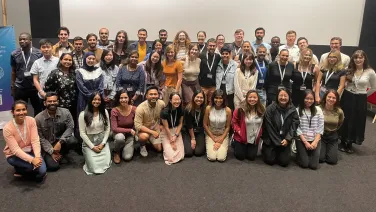
The Shirokikh Group - Protein Biosynthesis and Homeostatic Control
Our main approach is to precisely define the types of rapid cell responses by analysing the gene-specific levels of translation.
Research themes
About
We know what is encoded in our genomes by sequencing their DNA. But we lack a complete understanding of how this code is used by our cells to robustly function across minute homeostasis, development and disease. Approaching previously not well-accessible responses and metabolic adjustments of the cells based on the translation of transient ribonucleic acid (RNA; transcriptome) into proteins (protein biosynthesis), we can discover entirely new ways to master cellular behaviour, increase productive lifespan and enrich technology and society.
Our main approach is to precisely define the types of rapid cell responses by analysing the gene-specific levels of translation (decoding of the genetic RNA sequence into functional amino acid sequence of the proteins) on the background of transcription (synthesis of RNA based on DNA sequence in the genome) for each response and cell type. To achieve this, we use a suit of ‘high throughput’ RNA and protein methods of broad discovery combined with computational biology (bolstered with classical methods of biochemistry, molecular and structural biology), and create our own techniques.
Translational responses (alterations in the levels of protein synthesis from RNA) are of a highest interest to us as they provide an insight into the underexplored areas of flexibility and adaptability of life. Cells of higher eukaryotes have particularly complex and diverse mechanisms of protein synthesis control, which are embedded in many developmental and homeostatic programs of the organisms. Life-critical processes such as mechanisms of cell differentiation during embryonic development and formation of nervous system and its dynamic reprogramming (‘synaptic plasticity’) are largely defined at the level of RNA-controlled protein biosynthesis.
Dysregulated protein biosynthesis (dysregulated translation) is pertinent to a multitude of disorders. RNA-controlled protein biosynthesis also serves as the core of the cells’ metabolic regulation and maintains homeostasis and cell proliferation decisions appropriate to the external and internal environments. As such, it is critical for the rapid mitigation of stress damage, age-related diseases and cancer.
Motivated by its importance for life, we wish to investigate questions of basic biology of dynamic protein synthesis control as well as its applied health- and method-focused problems.







